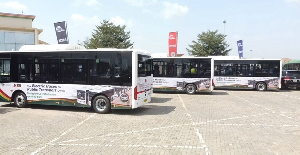In a significant step toward modernising public transportation and promoting environmental sustainability, Vice President Dr. Mahamudu Bawumia has launched Ghana's first fleet of electric buses.
The unveiling of the fleet marks a major milestone in the country’s push for greener, more efficient, and affordable urban mobility.
Speaking at the launch event in Accra on November 27, 2024, the Vice President said the bus fleet promises to cut down transport fares by 40-50% while serving as a model for sustainable urban transport across the country and Africa.
He also highlighted the government’s commitment to not only improving transportation services but also addressing climate change and creating a cleaner, more inclusive urban environment for all Ghanaians.
“This initiative is about more than just buses; it’s about creating a sustainable future for generations to come,” Dr. Bawumia said during the unveiling ceremony.
Here are some key features of the new electric buses:
1. Cost Efficiency
The electric buses are designed to reduce transport costs dramatically, with fares set to decrease by up to 40-50%. This initiative aims to make public transportation more affordable, benefiting commuters across the country, particularly in urban areas where transport costs are a significant burden for many.
2. Environmental Impact
One of the standout features of the electric buses is their environmentally friendly design. The buses will reduce greenhouse gas emissions by up to 70%, contributing to improved air quality in urban centers. With less pollution from vehicle emissions, cities are set to see a positive environmental impact, which aligns with Ghana's broader sustainability goals.
3. Reduced Noise Pollution
In addition to cutting emissions, the electric buses offer a quieter alternative to traditional diesel-powered buses. With significantly lower noise levels, the buses will enhance the overall urban experience, making the environment more pleasant for both commuters and residents.
4. Increased Accessibility
The buses are equipped with wider doors and low-floor entry ramps, making them fully accessible for persons with disabilities, the elderly, and parents with strollers. This focus on inclusivity ensures that everyone, regardless of mobility challenges, can easily use the new transport service.
5. Reliability and Timeliness
The new fleet is designed to improve the reliability of public transport services. The buses will offer on-time services, aiming to reduce the common challenges of delays and overcrowding that commuters often face. This will help enhance the overall travel experience and reduce stress for passengers.
6. Job Creation
Beyond the environmental and social benefits, the electric buses are expected to generate new job opportunities. These include positions in vehicle maintenance, charging infrastructure management, and route optimization. The creation of these jobs will contribute to the country’s economic development and provide new employment avenues for Ghanaians.
Operational Framework and Expansion
The electric buses will be managed in collaboration with Metro Mass Transit Limited (MMTL) and the Greater Accra Passenger Transport Executive (GAPTE).
GAPTE will be responsible for charging infrastructure and optimizing bus routes.
The pilot phase of the project will focus on routes within the Adenta Municipality, with plans for expansion to other urban areas based on performance evaluations.
The GAPTE Adenta Terminal will serve as the operational hub, supported by strategically placed charging ports at GAPTE’s headquarters in Adenta Aviation.
MA
Watch Dr. Bawumia at the launch below
Business News of Wednesday, 27 November 2024
Source: www.ghanaweb.com













